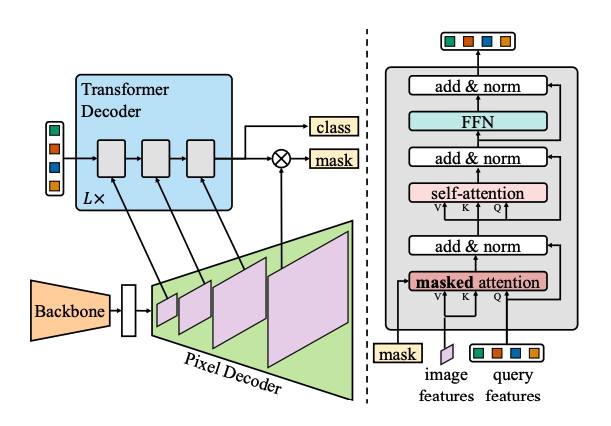File size: 3,185 Bytes
5db6d14 1768850 d0921de 5db6d14 |
1 2 3 4 5 6 7 8 9 10 11 12 13 14 15 16 17 18 19 20 21 22 23 24 25 26 27 28 29 30 31 32 33 34 35 36 37 38 39 40 41 42 43 44 45 46 47 48 49 50 51 52 53 54 55 56 57 58 59 60 61 62 63 64 65 66 67 |
---
license: other
tags:
- vision
- image-segmentation
datasets:
- coco
widget:
- src: http://images.cocodataset.org/val2017/000000039769.jpg
example_title: Cats
- src: http://images.cocodataset.org/val2017/000000039770.jpg
example_title: Castle
---
# Mask2Former
Mask2Former model trained on Cityscapes semantic segmentation (small-sized version, Swin backbone). It was introduced in the paper [Masked-attention Mask Transformer for Universal Image Segmentation
](https://arxiv.org/abs/2112.01527) and first released in [this repository](https://github.com/facebookresearch/Mask2Former/).
Disclaimer: The team releasing Mask2Former did not write a model card for this model so this model card has been written by the Hugging Face team.
## Model description
Mask2Former addresses instance, semantic and panoptic segmentation with the same paradigm: by predicting a set of masks and corresponding labels. Hence, all 3 tasks are treated as if they were instance segmentation. Mask2Former outperforms the previous SOTA,
[MaskFormer](https://arxiv.org/abs/2107.06278) both in terms of performance an efficiency by (i) replacing the pixel decoder with a more advanced multi-scale deformable attention Transformer, (ii) adopting a Transformer decoder with masked attention to boost performance without
without introducing additional computation and (iii) improving training efficiency by calculating the loss on subsampled points instead of whole masks.

## Intended uses & limitations
You can use this particular checkpoint for panoptic segmentation. See the [model hub](https://huggingface.co/models?search=mask2former) to look for other
fine-tuned versions on a task that interests you.
### How to use
Here is how to use this model:
```python
import requests
import torch
from PIL import Image
from transformers import AutoImageProcessor, Mask2FormerForUniversalSegmentation
# load Mask2Former fine-tuned on Cityscapes semantic segmentation
processor = AutoImageProcessor.from_pretrained("facebook/mask2former-swin-small-cityscapes-semantic")
model = Mask2FormerForUniversalSegmentation.from_pretrained("facebook/mask2former-swin-small-cityscapes-semantic")
url = "http://images.cocodataset.org/val2017/000000039769.jpg"
image = Image.open(requests.get(url, stream=True).raw)
inputs = processor(images=image, return_tensors="pt")
with torch.no_grad():
outputs = model(**inputs)
# model predicts class_queries_logits of shape `(batch_size, num_queries)`
# and masks_queries_logits of shape `(batch_size, num_queries, height, width)`
class_queries_logits = outputs.class_queries_logits
masks_queries_logits = outputs.masks_queries_logits
# you can pass them to processor for postprocessing
predicted_semantic_map = processor.post_process_semantic_segmentation(outputs, target_sizes=[image.size[::-1]])[0]
# we refer to the demo notebooks for visualization (see "Resources" section in the Mask2Former docs)
```
For more code examples, we refer to the [documentation](https://huggingface.co/docs/transformers/master/en/model_doc/mask2former). |